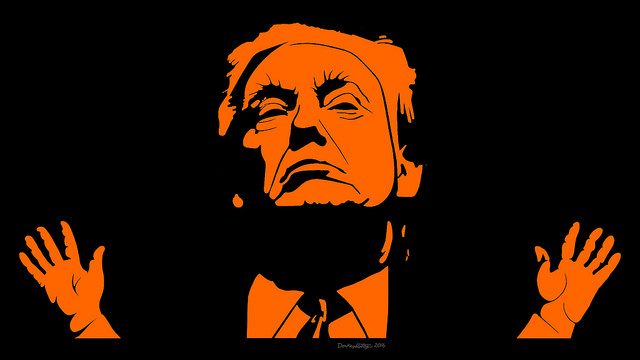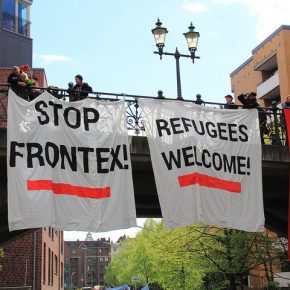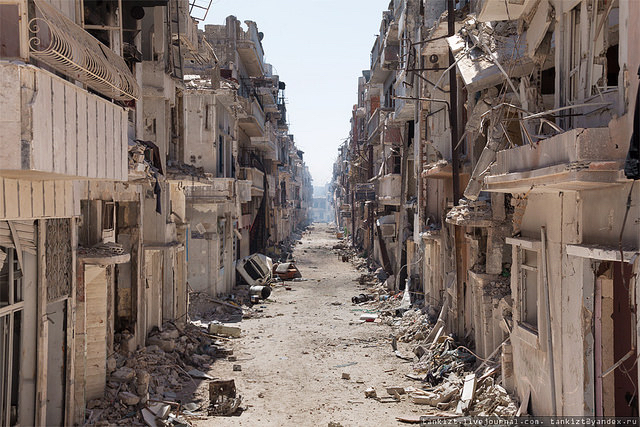The new U.S. president wants his Syrian counterpart to stay. Journalist Annia Ciezadlo explains what that’s going to mean for the nearly half of Syrian civilians who are stranded by war.
BEIRUT – On the morning of November 9, as the U.S. presidential votes were being counted, residents of rebel-held eastern Aleppo, which has been under total siege since July, were trying to find some consolation in dark humor.
“I think Trump will win in the elections because he is the real face for the American politics,” Najmaldin Khaled, an English teacher and editor at the Shahba Press Agency, said in a group conversation on WhatsApp that residents of Eastern Aleppo use to communicate with the outside world.
“Trying to look at the bright side of it, no more claims about the ‘friends’ of Syrian people, it seems,” replied Wissam Zarqa, also a teacher.
If the Obama administration has supported the Syrian opposition more with words than with deeds, the incoming administration may not even do that. U.S. president-elect Donald Trump has made it clear that he considers the fight against the so-called Islamic State more important than anything else in the Middle East – including Syrian civilian lives, which are likely to be a low priority for his administration. Syrian president Bashar al-Assad is “bad,” Trump has noted, but the U.S.-backed rebels “could be worse” – exactly the lesser evil image that Assad has been carefully cultivating for years.
On November 16, in an interview with the Portuguese state channel RTP, Assad said the United States and Syria would be “natural allies” in the so-called war on terror – but only if the U.S. president-in-waiting met his expectations: to respect international law, to not interfere in other countries and to “stop supporting terrorists in Syria.” Until Trump proves himself, Assad said – with the air of a manager granting an underling probation – he will “wait and see.”
“Of course, I would say this is promising, but can he deliver?” said the Syrian head of state. His U.S. counterpart would face many “countervailing forces,” Assad pointed out, adding that Trump had never held elected office before. But if Trump really is going to fight “the terrorists” – a term the Syrian president, like the U.S. military, often uses indiscriminately to describe anyone who opposes him – “of course we are going to be [an] ally, [a] natural ally in that regard with the Russian, with the Iranian, with many other countries who wanted to defeat the terrorists.”
With the American government making a pivot toward Russia, and Assad sitting in the catbird seat, the first casualty of the rapprochement between Trump and Assad is likely to be rebel-held eastern Aleppo. Because Aleppo is not a battleground for ISIS, it’s not a priority for either Obama or Trump. Barely a week after the election, the Syrian government and its ally, Russia, launched a devastating aerial bombardment of eastern Aleppo.
As the Syrian president and his American counterpart continued their diplomatic flirtation, warplanes were bombing eastern Aleppo’s last remaining hospitals – seven hospitals, for a quarter of a million people – out of commission. “A world where running a hospital or a school is becoming a crime [that] one should hide is a crazy world,” said Zarqa, the teacher from eastern Aleppo, on November 18. “Trump is the best representative of its leaders.”
Under Obama, the U.S. government has funneled up to $1 billion a year in weaponry, primarily antitank missiles, to various armed groups fighting the Syrian government. Trump has been saying for months now that, if elected, he will most likely cut off U.S. military aid to Syrian rebel groups.
“I’ve had an opposite view of many people regarding Syria,” Trump told the Wall Street Journal on November 11. “My attitude was you’re fighting Syria, Syria is fighting ISIS and you have to get rid of ISIS. Russia is now totally aligned with Syria, and now you have Iran, which is becoming powerful, because of us, is aligned with Syria … Now we’re backing rebels against Syria, and we have no idea who these people are.”
If Trump does end U.S. support for rebel troops, one possible scenario for eastern Aleppo and areas like it might well be a series of negotiated surrenders, such as the “truces” that cleared rebels and civilians out of besieged areas such as Daraya, the al-Waer neighborhood of Homs and Mouadamiya. The government transferred most of the populations of those areas to Idlib, a northwestern province with poor infrastructure predominantly controlled by armed anti-government groups. For the past year, Idlib has been subject to bombings almost daily from Russian, Syrian and American warplanes.
Large-scale population transfers would sit well with one policy that the Trump administration may pursue – “safe zones” in northern Syria along the Turkish border, an option that vice president-elect Mike Pence and other hard-right conservatives have been pushing. During the vice presidential debates, Pence recommended setting up safe zones to be administered by “our Arab partners” – presumably Saudi Arabia and its allies in the Gulf Cooperation Council (although it’s entirely possible he may have also meant Turkey, which is a U.S. ally and NATO member, but not an Arab country).
Safe zones have a history of failure – as evidenced by the massacre of 8,000 civilians in the U.N.-designated “safe zone” of Srebrenica, the indiscriminate killing of Tutsis in humanitarian zones in Rwanda and the slaughter that ended the Sri Lankan civil war. But the policy appeals to Trump, who said last year he’d “take a big swatch of land” inside Syria – “which believe me, you get for the right price” – and set up a “big beautiful safe zone” instead of letting Syrian refugees “destroy all of Europe.”
A safe zone would actually require a more substantial military commitment than a no-fly zone, which was the policy that Trump’s rival, former secretary of state and Democratic presidential candidate Hillary Clinton, seemed to be leaning toward. This may actually be a plus for the incoming president, many of whose appointees are decidedly hawkish retired generals who will want to maintain some sort of military presence.
In the meantime, neither the old administration nor the incoming one seems willing to do anything to stop the bombardment. On November 19, the last hospitals in eastern Aleppo were forced to suspend operations. “I have never seen more pathetic ‘international community’ than what we are seeing,” said Zaher Sahloul, a Syrian-American physician and former head of the Syrian American Medical Society, in the WhatsApp group conversation. “It looks that the world has lost its compass and that is why we are punished by Trump.”
This article originally appeared on Syria Deeply, and you can find the original here. For important news about the war in Syria, you can sign up to the Syria Deeply email list. Photograph courtesy of DonkeyHotey. Published under a Creative Commons license.





